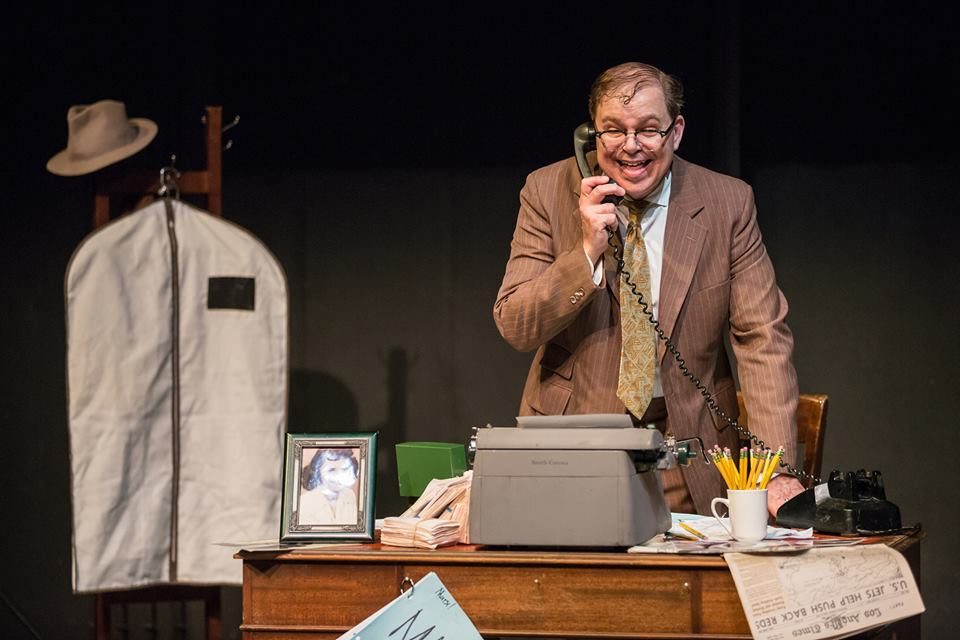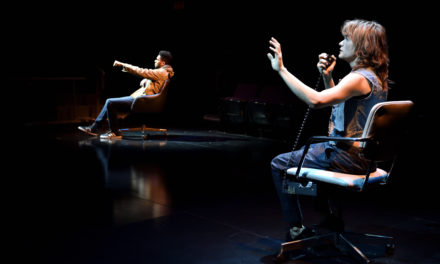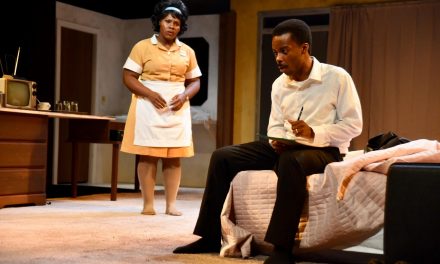Phil Johnson. photo: Bunbury Theatre
A Jewish Joke
By Phil Johnson and Marni Freedman
Directed by David Y. Chack
Review by Cristina Martin
Entire contents copyright © 2018 Cristina Martin. All rights reserved.
Walking to my car after seeing Bunbury Theatre’s current show at The Henry Clay, I had to return a phone call to my sister.
“What’s wrong?” she asked, hearing the heaviness in my voice right away. “I thought you were supposed to see something called A Jewish JOKE…”
Well, exactly. Make no mistake: Bunbury’s 90-minute one-man show, brought to Louisville thanks to the generosity of the Jewish Heritage Fund for Excellence and the Fund for the Arts, is filled with more classic Jewish jokes than you’ll hear anywhere this side of the mid-century Catskills. It’s billed as a drama about comedy and introduces us to Bernie Lutz (Phil Johnson), a writer at MGM during the McCarthy Era. Along with his writing partner and childhood friend Morris, Bernie has scripts in the works for the Marx brothers and Danny Kaye and knows how to get on Mr. L.B. Mayer’s good side with gifts of his wife’s delicious kugel for Mr. Mayer’s secretary. He has just picked up the tuxes for the premiere of the movie that represents mainstream success for the writing duo, “not bad for two little Jewish boys from New Jersey,” as Bernie says.
But the storm clouds gather in short order. There have been allegations that Bernie and Morris attended a party with communist sympathizers in the Hollywood hills last November. Reporters are calling and people are asking questions that have serious potential to derail all that the men have worked so hard to attain. A self-described “fast-dancing, joke-telling pretzel,” Bernie has become an expert at giving the people what they want; now, were he to be blacklisted, he could plunge from Somebody to pariah at warp speed. And whom are we kidding? Given the prejudices of 1950s America, Bernie’s position is all that more tenuous – regardless of whether there’s anything whatsoever behind the allegations – because he’s a Jew.
The play’s clear plot structure and good pacing are evident as Bernie sets about trying to track Morris down (he hasn’t made it in to the office yet), all the while making and taking a slew of phone calls in a desperate attempt to do damage control and convince the powers that be that he and his fellow writer are “patriots” rather than pinkos. On a set that is neither too elaborate nor too plain, Hannah Greene’s well-chosen props bring the time period to life. The cluttered writer’s desk downstage center, complete with typewriter and telephone, is balanced nicely by a hat rack upstage right and a table upstage left, giving Johnson various spaces and perspectives with which to work.
Phil Johnson commands the audience’s attention expertly. Under David Y. Chack’s direction, Johnson’s words, gestures, and mannerisms people our imagination with Bernie’s cosmos of associates and relationships. His phone conversations are as varied and interesting as they are numerous; we get such a vivid image of the people on the other end of the line, it’s hard to believe, when all is said and done, that Bernie is the only one we’ve actually laid eyes on. If there were a master class for actors in stage phone conversations, Johnson would be the one to lead it. It is awe-inspiring to watch one individual create something so gripping – a whole complex world of somethings and someones and their suggested backstories and subplots – all by himself. Even the office cat takes on a real presence because of the convincing way Bernie talks to it.
When Johnson mops his brow, it’s for real; when he remarks, “It’s been such a day!,” we feel it too. At one point, when Bernie takes off his glasses, stares off into the distance, and tells a tender story about his wife, you think your heart might just break.
When he’s not on the phone, Bernie is addressing the audience in a somewhat confessional, somewhat instructive vein. Every so often, he’ll say, “This calls for a joke,” pulling a notecard with a Jewish joke written on it out of a collection of them on his desk and proceeding to read the joke aloud. The jokes are great, but at first, they seem like non-sequiturs given everything else that’s going on until we begin to figure out the purpose that humor serves for Bernie.
“Comedy is a man in trouble,” Bernie says, quoting comedian Jerry Lewis. “Jews invented comedy… Remember the Book of Job and all that hilarity?” His point is that despite unspeakable suffering time and again throughout history, Jewish culture has not only survived but also preserved an extraordinary, life-affirming sense of humor that is eminently relatable. According to Bernie, “The American sense of humor is a Jewish sense of humor.” No one is supposed to know that, he says, but it’s true. Jews are good at making lemonade when given lemons, at making sense of what makes no sense. In one of the jokes he recounts, people are worried about a massive flood due to come and sweep them all away. “What should we do?” they ask. “That’s easy,” the Jewish mother replies. “You learn to breathe underwater.” Adaptability, strength, ingenuity, and resilience in the face of all odds: those are qualities evident in Jewish humor and ones any American would be proud to stand behind.
So to be able to laugh in the face of horrible experiences is at once a sign of strength and a distraction from the pain. Tension builds for Bernie, highlighted adeptly by the use of actual sound bytes from the McCarthy hearings and lighting that really makes it feel as though the walls are closing in upon him. We laugh at his jokes, but we’re filled with horror at his persecution and a mounting sense of dread at the devastating consequences he’ll face if he’s not able to clear his name somehow. Comedy, yes, but in the midst of the drama of insidious forces at work in the world.
To compound matters, Bernie is then faced with a huge moral dilemma. “We [Jews] take it, you give us more. That’s the joke,” he says wryly. He can react to this latest predicament either by choosing to be a part of the problem, which would spare him personally or by being a mensch (a “stand-up guy,” in Bernie’s words). Sadly, sticking by one’s principles is never guaranteed to be the easy way. Bernie finally makes his choice, and as the lights go down, a recording of Army lawyer Joseph Welch’s famous rebuke to Senator Joseph McCarthy fills the theatre: “Have you no sense of decency, sir, at long last? Have you left no sense of decency?” Historically, this rebuke represents a low point in the communist witch-hunt saga, after which public opinion began to rally against McCarthy. Whether that made life easier for our friend Bernie, we can only hope.
… So, as my sister asked me, “What’s wrong?”
A whole hell of a lot, in this world of ours. There always has been. Injustice and perfidy and persecution have been around since the dawn of time; thinking about their pervasiveness is enough to make anyone’s heart heavy. But if we can survive the horrors of existence and even laugh from time to time in spite of them, we will have learned an invaluable lesson in resilience. And that represents a genuine triumph of the human spirit. L’Chaim.
A Jewish Joke
A Bunbury/ShPIeL Identity Theatre Project production
October 4-21, 2018
Bunbury Theatre Company
at The Henry Clay
604 S. Third St.
Louisville, KY 40202
(502) 585-5306
bunburytheatre.org
A lover of the arts in every form, Cristina Martin has a background in theatre, dance, and classical music. A native of Chicago, she currently lives in Louisville with her husband, three active young boys, two rambunctious dogs and a cat as old as the hills.





